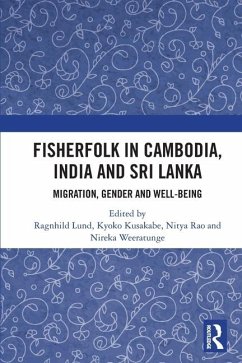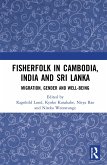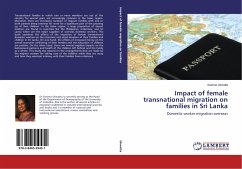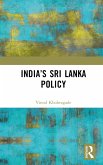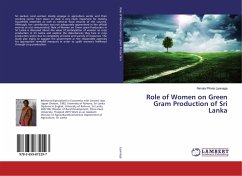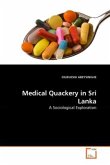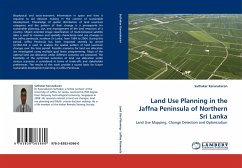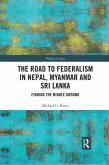Fisherfolk in Cambodia, India and Sri Lanka
Migration, Gender and Well-being
Herausgeber: Lund, Ragnhild; Rao, Nitya; Kusakabe, Kyoko
Fisherfolk in Cambodia, India and Sri Lanka
Migration, Gender and Well-being
Herausgeber: Lund, Ragnhild; Rao, Nitya; Kusakabe, Kyoko
- Broschiertes Buch
- Merkliste
- Auf die Merkliste
- Bewerten Bewerten
- Teilen
- Produkt teilen
- Produkterinnerung
- Produkterinnerung
This volume studies the coastal and riparian fishing communities of three Asian countries - Cambodia, India and Sri Lanka. It explores issues of migration and movement, gender relations, wellbeing, and nature-society relations common among these communities.
Andere Kunden interessierten sich auch für
![Fisherfolk in Cambodia, India and Sri Lanka Fisherfolk in Cambodia, India and Sri Lanka]() Fisherfolk in Cambodia, India and Sri Lanka195,99 €
Fisherfolk in Cambodia, India and Sri Lanka195,99 €![Impact of female transnational migration on families in Sri Lanka Impact of female transnational migration on families in Sri Lanka]() Swarna UkwattaImpact of female transnational migration on families in Sri Lanka53,99 €
Swarna UkwattaImpact of female transnational migration on families in Sri Lanka53,99 €![India's Sri Lanka Policy India's Sri Lanka Policy]() Vinod KhobragadeIndia's Sri Lanka Policy196,99 €
Vinod KhobragadeIndia's Sri Lanka Policy196,99 €![Role of Women on Green Gram Production of Sri Lanka Role of Women on Green Gram Production of Sri Lanka]() Nimala Pitivila LiyanageRole of Women on Green Gram Production of Sri Lanka37,99 €
Nimala Pitivila LiyanageRole of Women on Green Gram Production of Sri Lanka37,99 €![Medical Quackery in Sri Lanka Medical Quackery in Sri Lanka]() DILRUKSHI ABEYSINGHEMedical Quackery in Sri Lanka40,99 €
DILRUKSHI ABEYSINGHEMedical Quackery in Sri Lanka40,99 €![Land Use Planning in the Jaffna Peninsula of Northern Sri Lanka Land Use Planning in the Jaffna Peninsula of Northern Sri Lanka]() Suthakar KarunakaranLand Use Planning in the Jaffna Peninsula of Northern Sri Lanka53,99 €
Suthakar KarunakaranLand Use Planning in the Jaffna Peninsula of Northern Sri Lanka53,99 €![The Road to Federalism in Nepal, Myanmar and Sri Lanka The Road to Federalism in Nepal, Myanmar and Sri Lanka]() Michael G BreenThe Road to Federalism in Nepal, Myanmar and Sri Lanka67,99 €
Michael G BreenThe Road to Federalism in Nepal, Myanmar and Sri Lanka67,99 €-
-
-
This volume studies the coastal and riparian fishing communities of three Asian countries - Cambodia, India and Sri Lanka. It explores issues of migration and movement, gender relations, wellbeing, and nature-society relations common among these communities.
Hinweis: Dieser Artikel kann nur an eine deutsche Lieferadresse ausgeliefert werden.
Hinweis: Dieser Artikel kann nur an eine deutsche Lieferadresse ausgeliefert werden.
Produktdetails
- Produktdetails
- Verlag: Routledge India
- Seitenzahl: 254
- Erscheinungstermin: 25. September 2023
- Englisch
- Abmessung: 234mm x 156mm x 14mm
- Gewicht: 392g
- ISBN-13: 9780367512460
- ISBN-10: 0367512467
- Artikelnr.: 68715840
- Herstellerkennzeichnung
- Libri GmbH
- Europaallee 1
- 36244 Bad Hersfeld
- gpsr@libri.de
- Verlag: Routledge India
- Seitenzahl: 254
- Erscheinungstermin: 25. September 2023
- Englisch
- Abmessung: 234mm x 156mm x 14mm
- Gewicht: 392g
- ISBN-13: 9780367512460
- ISBN-10: 0367512467
- Artikelnr.: 68715840
- Herstellerkennzeichnung
- Libri GmbH
- Europaallee 1
- 36244 Bad Hersfeld
- gpsr@libri.de
Ragnhild Lund is Professor of Geography in the Department of Geography, Norwegian University of Science and Technology. Her research focuses on three broad areas: gender and development (livelihoods, body space, activism, rethinking and reproducing gender, gender-based violence); mobility and migration (mobile livelihoods, development-induced displacement, gendered mobility, indigenous people); and social geography (cultural encounters, youths, children, friends, house and home, post-war and post-disaster recovery). She has published extensively in international peer-reviewed journals and books, and has led several large research projects in Asia. Kyoko Kusakabe is Professor of Gender and Development Studies, Department of Development and Sustainability, School of Environment, Resources and Development, Asian Institute of Technology (AIT), Thailand. Her main research interests are in gender and work, especially around labour migration, unpaid work and unpaid care work, and informal economy, as well as fisheries and aquaculture. She has worked extensively with other academics, as well as with local NGOs and groups, governments, and both international and UN organizations. Nitya Rao is Professor of Gender and Development in the School of International Development, University of East Anglia, Norwich, UK. She has worked extensively as a researcher and advocate in the field of women's rights, employment and education for over three decades. Her research interests include exploring the gendered changes in land and agrarian relations, and migration and livelihoods, especially in contexts of climatic variability and economic precarity. She has conducted fine-grained research on intra-household dynamics in these contexts to draw out implications for gendered well-being, with a focus on food and nutrition security. She has published extensively in international peer-reviewed journals and books. Nireka Weeratunge is an anthropologist and research fellow at the International Centre for Ethnic Studies (ICES) in Colombo, Sri Lanka. Her main areas of research are the social and cultural aspects of natural resource use, focusing on gender and livelihood strategies in relation to poverty, vulnerability, well-being, and the resilience of rural households in fishing and farming communities. She has a PhD in anthropology from the University of Toronto, Canada.
1. Fishers on the move: Changing livelihoods, gendered entanglements and
well-being 2. Migration for capital accumulation: Changing class dynamics
among small-scale fishers on the Coromandel Coast, Tamil Nadu 3. Adapting
to diminishing fish resources in Cambodia: Fisheries on the shoulders of
women and migrating adult children in fishing communities 4. Seasonal
migration, resource access, contestation and conflict among fishers on the
west and east coasts of Sri Lanka 5. Female headship and exclusion from
small-scale fishing in Eastern Province, Sri Lanka 6. To migrate or not:
Social well-being and gendered household decision-making in fishing
communities on the west and east coasts of Sri Lanka 7. Fishing in distant
waters: Issues of identity and well-being amongst migrant fishers on the
west coast of Tamil Nadu 8. Immobility of ethnic Vietnamese fishers and
their adaptation strategy in Chhnok Tru village, Chhnok Tru Commune,
Cambodia 9. Mobility in contexts of precarity: Kin solidarity and migrant
networks among small-scale fishers in coastal Tamil Nadu 10. Mobilizing for
and against migration: Gendered networks, cooperation and collective action
in fishing communities on the west and east coasts of Sri Lanka 11. Gender
and power struggle in community fisheries in Cambodia: Creating space for
women's leadership 12. Livelihoods, migration and mobility: The
distribution of consumption expenditure in fishing communities in Cambodia,
India and Sri Lanka 13. Small-scale fishers, mobility, and the politics of
well-being in rapidly changing Asia
well-being 2. Migration for capital accumulation: Changing class dynamics
among small-scale fishers on the Coromandel Coast, Tamil Nadu 3. Adapting
to diminishing fish resources in Cambodia: Fisheries on the shoulders of
women and migrating adult children in fishing communities 4. Seasonal
migration, resource access, contestation and conflict among fishers on the
west and east coasts of Sri Lanka 5. Female headship and exclusion from
small-scale fishing in Eastern Province, Sri Lanka 6. To migrate or not:
Social well-being and gendered household decision-making in fishing
communities on the west and east coasts of Sri Lanka 7. Fishing in distant
waters: Issues of identity and well-being amongst migrant fishers on the
west coast of Tamil Nadu 8. Immobility of ethnic Vietnamese fishers and
their adaptation strategy in Chhnok Tru village, Chhnok Tru Commune,
Cambodia 9. Mobility in contexts of precarity: Kin solidarity and migrant
networks among small-scale fishers in coastal Tamil Nadu 10. Mobilizing for
and against migration: Gendered networks, cooperation and collective action
in fishing communities on the west and east coasts of Sri Lanka 11. Gender
and power struggle in community fisheries in Cambodia: Creating space for
women's leadership 12. Livelihoods, migration and mobility: The
distribution of consumption expenditure in fishing communities in Cambodia,
India and Sri Lanka 13. Small-scale fishers, mobility, and the politics of
well-being in rapidly changing Asia
1. Fishers on the move: Changing livelihoods, gendered entanglements and
well-being 2. Migration for capital accumulation: Changing class dynamics
among small-scale fishers on the Coromandel Coast, Tamil Nadu 3. Adapting
to diminishing fish resources in Cambodia: Fisheries on the shoulders of
women and migrating adult children in fishing communities 4. Seasonal
migration, resource access, contestation and conflict among fishers on the
west and east coasts of Sri Lanka 5. Female headship and exclusion from
small-scale fishing in Eastern Province, Sri Lanka 6. To migrate or not:
Social well-being and gendered household decision-making in fishing
communities on the west and east coasts of Sri Lanka 7. Fishing in distant
waters: Issues of identity and well-being amongst migrant fishers on the
west coast of Tamil Nadu 8. Immobility of ethnic Vietnamese fishers and
their adaptation strategy in Chhnok Tru village, Chhnok Tru Commune,
Cambodia 9. Mobility in contexts of precarity: Kin solidarity and migrant
networks among small-scale fishers in coastal Tamil Nadu 10. Mobilizing for
and against migration: Gendered networks, cooperation and collective action
in fishing communities on the west and east coasts of Sri Lanka 11. Gender
and power struggle in community fisheries in Cambodia: Creating space for
women's leadership 12. Livelihoods, migration and mobility: The
distribution of consumption expenditure in fishing communities in Cambodia,
India and Sri Lanka 13. Small-scale fishers, mobility, and the politics of
well-being in rapidly changing Asia
well-being 2. Migration for capital accumulation: Changing class dynamics
among small-scale fishers on the Coromandel Coast, Tamil Nadu 3. Adapting
to diminishing fish resources in Cambodia: Fisheries on the shoulders of
women and migrating adult children in fishing communities 4. Seasonal
migration, resource access, contestation and conflict among fishers on the
west and east coasts of Sri Lanka 5. Female headship and exclusion from
small-scale fishing in Eastern Province, Sri Lanka 6. To migrate or not:
Social well-being and gendered household decision-making in fishing
communities on the west and east coasts of Sri Lanka 7. Fishing in distant
waters: Issues of identity and well-being amongst migrant fishers on the
west coast of Tamil Nadu 8. Immobility of ethnic Vietnamese fishers and
their adaptation strategy in Chhnok Tru village, Chhnok Tru Commune,
Cambodia 9. Mobility in contexts of precarity: Kin solidarity and migrant
networks among small-scale fishers in coastal Tamil Nadu 10. Mobilizing for
and against migration: Gendered networks, cooperation and collective action
in fishing communities on the west and east coasts of Sri Lanka 11. Gender
and power struggle in community fisheries in Cambodia: Creating space for
women's leadership 12. Livelihoods, migration and mobility: The
distribution of consumption expenditure in fishing communities in Cambodia,
India and Sri Lanka 13. Small-scale fishers, mobility, and the politics of
well-being in rapidly changing Asia

